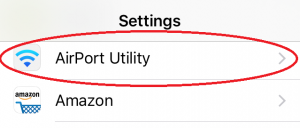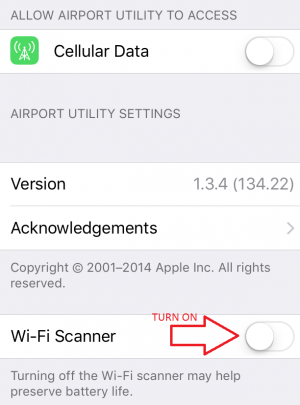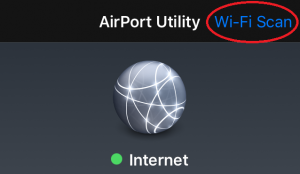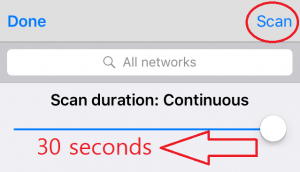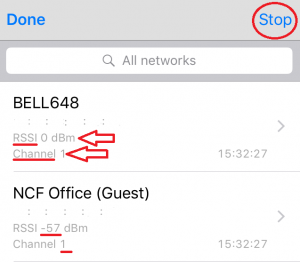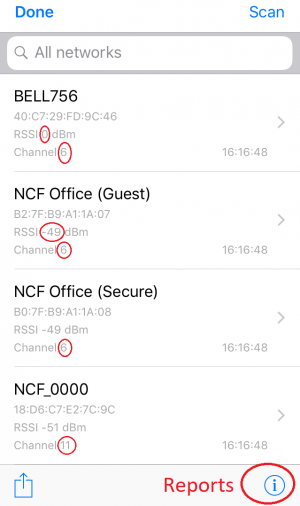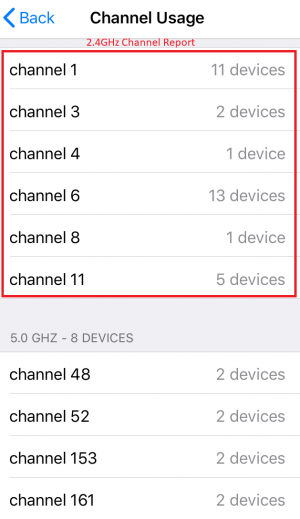Difference between revisions of "WiFi Analyzer for iOS"
m |
m |
||
| Line 20: | Line 20: | ||
6. You will know the scan is completed when the '''Stop''' option in the top right corner changes back to '''Scan'''. Now you can see all the networks with their channels and RSSI levels. If the '''Scan''' doesn't stop after 30 seconds click '''Stop.''' | 6. You will know the scan is completed when the '''Stop''' option in the top right corner changes back to '''Scan'''. Now you can see all the networks with their channels and RSSI levels. If the '''Scan''' doesn't stop after 30 seconds click '''Stop.''' | ||
[[File:AirportUtility5.png|alt=Airport Utility - Scan Results|none|thumb|Airport Utility - Scan Results]] | [[File:AirportUtility5.png|alt=Airport Utility - Scan Results|none|thumb|Airport Utility - Scan Results]] | ||
7. Click on the info icon in the bottom right corner of the results page. | 7. The page will display a list of the WiFi networks around you, their RSSI and Channels. The RSSI represents the signal strength of the networks around you. Click on the info icon in the bottom right corner of the results page. | ||
[[File:AirportUtility7.png|alt=AirportUtility - Channel Reports Icon|none|thumb|Airport Utility - Channel Reports Icon]] | [[File:AirportUtility7.png|alt=AirportUtility - Channel Reports Icon|none|thumb|Airport Utility - Channel Reports Icon]] | ||
8. Take a screenshot by using the key combination '''Power+Home''' and send the pictures to [mailto:support@ncf.ca support@ncf.ca] or in response to the most recent ticket email you have received from the NCF Help Desk. | 8. Take a screenshot by using the key combination '''Power+Home''' and send the pictures to [mailto:support@ncf.ca support@ncf.ca] or in response to the most recent ticket email you have received from the NCF Help Desk. | ||
[[File:AirportUtility6.png|alt=AirportUtility - Channel Summary|none|thumb|Airport Utility - Channel Summary]] | [[File:AirportUtility6.png|alt=AirportUtility - Channel Summary|none|thumb|Airport Utility - Channel Summary]] | ||
'''How to Interpret the Reports:''' | |||
* Avoid the high device count channels. In this images, those will be Channels 1, 6 and 11 | |||
* Take note of 2.4GHz channels (1 through 11) that are not listed because they have no routers broadcasting over them within your scan range. In this image those will be Channels 2, 5, 7, 9 | |||
* If you're configuring your modem yourself, you want to avoid the channels of the top 5 WiFi networks besides your own. | |||
* '''Your recommended channels''' will be those with the fewest or no devices on them, which are not adjacent to the top 5 WiFi networks next to your own. | |||
10. '''REMEMBER:''' go back into the '''Settings''' and turn off the '''WiFi-Scanner''' to conserve your device's battery. | |||
{{Template:WiFi_Analyzer_See_Also}} | {{Template:WiFi_Analyzer_See_Also}} | ||
Revision as of 09:07, 1 May 2019
WiFi Analyzers: Windows | Windows 10 | Android | iOS | MacOS | Linux
How to Install and Check for WiFi Interference at Your Premises and Produce a Report for NCF
1. Download the AirPort Utility from the Appstore.
2. Go to iOS Settings and find scroll down until you find the AirPort Utility.
3. Turn WiFi Scanner on.
4. Open AirPort Utility and tap Wi-Fi Scan.
5. Change the Scan Duration from Continuous to 30 seconds by moving the Slider. Then tap Scan and wait 30 seconds.
6. You will know the scan is completed when the Stop option in the top right corner changes back to Scan. Now you can see all the networks with their channels and RSSI levels. If the Scan doesn't stop after 30 seconds click Stop.
7. The page will display a list of the WiFi networks around you, their RSSI and Channels. The RSSI represents the signal strength of the networks around you. Click on the info icon in the bottom right corner of the results page.
8. Take a screenshot by using the key combination Power+Home and send the pictures to support@ncf.ca or in response to the most recent ticket email you have received from the NCF Help Desk.
How to Interpret the Reports:
- Avoid the high device count channels. In this images, those will be Channels 1, 6 and 11
- Take note of 2.4GHz channels (1 through 11) that are not listed because they have no routers broadcasting over them within your scan range. In this image those will be Channels 2, 5, 7, 9
- If you're configuring your modem yourself, you want to avoid the channels of the top 5 WiFi networks besides your own.
- Your recommended channels will be those with the fewest or no devices on them, which are not adjacent to the top 5 WiFi networks next to your own.
10. REMEMBER: go back into the Settings and turn off the WiFi-Scanner to conserve your device's battery.

